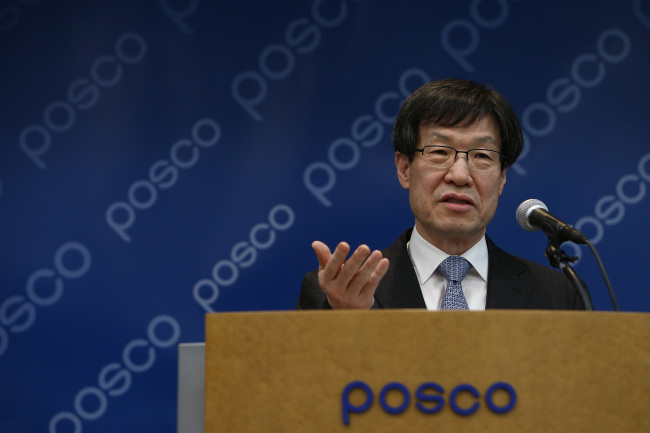POSCO chairman Kwon Oh-joon has aggressively pushed ahead with restructuring since he took the helm a year ago. But the struggling South Korean steel giant continues to be in rough waters.
Since his appointment as the POSCO chief last year, Kwon has improved the company’s profitability. POSCO reported sales of 65.9 trillion won ($59.9 billion) and 3.2 trillion won in operating profit in 2014, up 5.2 percent and 7.3 percent from a year ago, respectively.
He is now faced with the daunting tasks of further strengthening its core steel business through the development of new materials and technologies.
Global steel companies including POSCO have suffered declining profits due to oversupply and low-price competition, dealing a severe blow to their bottom lines since the 2008 financial crisis.
 |
| POSCO chairman Kwon Oh-joon. (Bloomberg) |
“We will continue to speed up restructuring and buckle up to achieve sound financial results this year,” Kwon said in a meeting with investors last month.
Under the new direction, POSCO sold off its real estate assets and affiliates such as POSCO Specialty Steel, POSFINE ― which sells ground blast-furnace slag to cement companies ― Diamond Plaza in Vietnam and Daewoo Department Store in Masan, South Gyeongsang Province.
The divestiture led POSCO to secure 2 trillion won in cash and lower its debt ratio to 23.8 percent last year from 28.2 percent in 2013.
This came as Kwon reiterated that POSCO would focus on its core business for growth.
For instance, POSCO launched a production line for automotive steel sheets at its Gwangyang plant amid a positive outlook for the global auto market.
It will also divest part of its holdings in a liquefied natural gas terminal in the region in a bid to offload its noncore business.
“Steel products for automobiles are one of our seven strategic product categories for the group’s future growth,’’ Kwon told POSCO investors.
The company will export its FINEX technology ― the next-generation iron-making process technology enabling users to lower production and environmental costs by skipping the coking and sintering processes of steelmaking ― to China.
According to POSCO, the steelmaker is currently waiting for the Chinese government’s approval to build a FINEX steel mill with an annual production capacity of 3 million tons with China’s Chongqing Iron and Steel.
The company said it would decrease investment in nonsteel business by 1.2 trillion won to 4.2 trillion won this year.
By Park Han-na (hnpark@heraldcorp.com)

